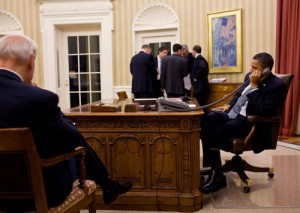 The crisis in Egypt remains acute: Mubarak is ignoring persistent and increasingly defiant calls to step down, over 300 protesters have been killed, and law and order is only now being restored after days of unhinged burning and looting. (Thankfully, previous reports about the looting of priceless artifacts from Egyptian museums were grossly exaggerated. All major museums and historic sites are now under tight security.)
The crisis in Egypt remains acute: Mubarak is ignoring persistent and increasingly defiant calls to step down, over 300 protesters have been killed, and law and order is only now being restored after days of unhinged burning and looting. (Thankfully, previous reports about the looting of priceless artifacts from Egyptian museums were grossly exaggerated. All major museums and historic sites are now under tight security.)
Many political commentators are asserting that the military, which will be pivotal in resolving this crisis – one way or the other, tipped its hand yesterday when it finally issued a statement. It read, in part, as follows:
The presence of the army in the streets is for your sake and to ensure your safety and wellbeing. The armed forces will not resort to use of force against our great people.
Your armed forces, who are aware of the legitimacy of your demands and are keen to assume their responsibility in protecting the nation and the citizens, affirms that freedom of expression through peaceful means is guaranteed to everybody.
(Al Jazeera, January 31, 2011)
The problem with this statement, however, is that recognizing the legitimacy of the protesters’ demands and helping them enforce those demands are two very different things. Hell, that Mubarak is busy reshuffling his Cabinet, promising every Egyptian a job, and pledging to hold free and fair elections all indicate that even he recognizes the legitimacy of their demands.
 Specifically, the army did not say that it will force Mubarak to resign, which happens to be the only demand that matters to the protesters at this point. And, if all the military does is join the police in maintaining law and order (as, apparently, will be the case), Mubarak will probably be quite happy to sit back and let the protesters vent their spleens.
Specifically, the army did not say that it will force Mubarak to resign, which happens to be the only demand that matters to the protesters at this point. And, if all the military does is join the police in maintaining law and order (as, apparently, will be the case), Mubarak will probably be quite happy to sit back and let the protesters vent their spleens.
In this respect, it is instructive to recall that Iranian protesters were expressing similar grievances and making similar demands in 2009. Yet the Iranian regime just sat back (after busting a few heads like Mubarak has now done) and let them vent their spleens for seven months … to no avail.
Therefore, as Egyptian protesters go on their “march of millions” today, it behooves them to be mindful that it’s one thing to vent for seven days, but quite another to do so for seven months. And this is especially so if essential services like banking, trash collecting, and Internet access continue to be interrupted.
So, 7 days down, 207 to go…? And even then there’s no guarantee that Mubarak will go?!
As a matter of fact, Mubarak must be feeling considerable pressure to stand firm from leaders of de facto dictatorships in Saudi Arabia, Jordan, Libya, Syria, Yemen, and Algeria who naturally fear what his downfall would portend for their dynastic rule too.
Meanwhile, the Obama administration is performing diplomatic contortions to pay lip service to America’s democratic principles while protecting and preserving the “constructive engagement” this country has enjoyed with all of these despotic leaders, in some cases for decades.
But the irony should not be lost on anyone that the very people now condemning the Obama administration for failing to back up its talk of an “orderly, peaceful transition to real democracy” with action to get rid of Mubarak, are the very ones who condemned the Bush administration for taking action to do just that to get rid of Saddam Hussein in Iraq. And no one personifies this irony, if not hypocrisy, quite like the protesters’ self-appointed leader, Mohammad ElBaradei.
 Frankly, my informed understanding of the geopolitical stakes involved compels me to commend President Obama for his deft handling of this situation thus far; insisting – as he has – that it’s for the Egyptian people to decide Mubarak’s fate.
Frankly, my informed understanding of the geopolitical stakes involved compels me to commend President Obama for his deft handling of this situation thus far; insisting – as he has – that it’s for the Egyptian people to decide Mubarak’s fate.
After all, if he publicly calls on Mubarak to resign, or takes any action (like withdrawing U.S. aid) to get rid of him, protesters in all of these other Arab countries would then expect him to do the same to help them get rid of their leaders. And if he does, then what does he do if protesters in China launch another Tiananmen Square uprising to get rid of their leaders – who actually make Mubarak look positively Jeffersonian? This is why calls for Obama to force the issue are not just uninformed, but irresponsible.
Not to mention Obama’s well-founded concern that free and fair elections might result in the election of a radical-Islamic government in Egypt (i.e., the Muslim Brotherhood) that is every bit as inimical to U.S. interests as the free and fair election of Hamas was in the Gaza Strip.
If they respect democratic principles they must respect the choice of the people.
This was how a spokesman for the dreaded Muslim Brotherhood telegraphed this ominous prospect in an interview with NBC News just yesterday. And this group is known as much for its advocacy of repressive Islamic law as for its anti-Semitism (which would open another can of worms).
Clearly this is not a crisis that calls for more simple-minded Bushisms; in this case, that you’re either with the protesters or with Mubarak. More to the point, with all due respect to the protesters, the issue is not whether Mubarak will go, for he will. (The man is 82 and already looks half dead for Christ’s sake!) Rather, the issue is who will replace him. And it appears they have not given any thought whatsoever to this very critical question…
This is why the Obama administration is trying so desperately to ensure that a moderate leader emerges from the orderly and peaceful transition to democracy it is calling for. But there are no guarantees….
To paraphrase a proverb, the devil the Egyptians know might prove far preferable to the devil they don’t (which might turn out to be the extremists of the Pan-Arab Muslim Brotherhood who believe that all Muslim states should be governed based on strict adherence to the Qur’an). Just ask the Iranians who got rid of the Mubarak-like Shah in 1979 only to end up with the Ayatollah – whose Islamic revolution they’ve regretted (and have longed to overturn) ever since….
Having said all that, I have no doubt that if I were in Egypt, I would be marching today too, especially since I believe these protests are as much about economic development and personal dignity as they are about democratic freedoms. So I wish them well. And even though I’ll be moving on to other topics tomorrow, my solidarity with their cause shall never die.
Related commentaries:
Egypt on fire…
Hamas “terrorists” win legitimate state power
Leave a Reply
You must be logged in to post a comment.